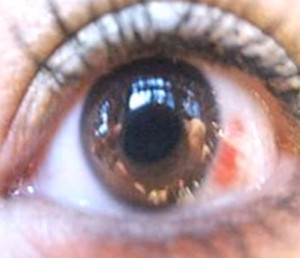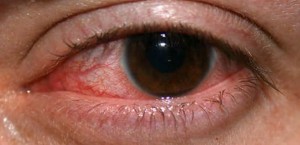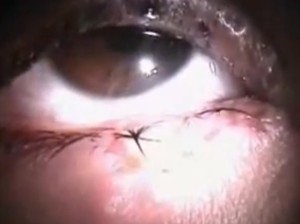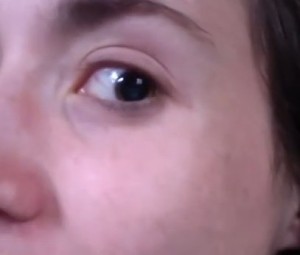Herpes of the eyes is an ocular condition caused due to infection by the herpes simplex virus, the very virus which causes herpes and cold sores. Herpes of the eyes is also known as ocular herpes, herpes simplex eye infection, or eye herpes.
Herpes virus eye infection is persistent, recurrent, and quite contagious. It typically affects the cornea leading to corneal inflammation. The virus may gain entry into the body via the mouth and nose, stay dormant within the nerves for many days and even years, before eventually causing herpes of the eye.
Symptoms
The signs and symptoms of herpes of the eye are an indication of the reactivation of the virus which has remained dormant for many days/ years after the primary infection. It is most commonly observed in people between the ages of 30 and 40 years. The infection may initially affect one eye in the beginning and later migrate to the other.
The intensity of the symptoms are majorly dependent on the location of viral infection. A few common symptoms are listed below:
- Inflammation and redness of the cornea
- Cloudy cornea
- Pain and irritation of the affected eye
- Swollen eyelid or swelling around the affected eye
- Ocular redness
- Sticky or watery discharge from the affected eye
- Increased tearing
- Photosensitivity or increased sensitivity to light
- Ocular sores
- Blurred vision
Types of herpes of the eye
Herpes of the eye can be classified into 3 types as per the location of the infection, i.e., stromal keratitis, herpes epithelial keratitis, and iridocyclitis.
- The most common form of herpes of the eye is herpes epithelial keratitis, wherein the infection affects the cornea. When only the uppermost layer of the cornea is infected, then treatment it easy. It also does not cause scarring.
- In stromal keratitis, the viral infection affects the deeper sections of the cornea and patients may suffer from scarring. Untreated instances of stromal keratitis herpes of the eye can result in blindness or loss of sight.
- Iridocyclitis is very rare and is marked by infection of the iris. Patients may suffer from ocular inflammation and pain as well as blurred vision.
Causes
- Herpes of the eye is caused due to infection by the herpes simplex virus. Infection by the virus for the first time is known as primary infection and it does not immediately cause herpes of the eye. It can lie dormant in the nerves for many years, without causing any health problems, before suddenly reactivating and causing varied conditions like cold sores and ocular herpes.
- The exact cause and trigger of such reactivation is not known. Doctors however believe that exposure to UV light, stress, trauma, fever, or surgery may cause the virus to become active.
- The infection is contagious and hence can easily spread via contact with an infected person, especially one who has cold sores.
- Herpes of the eye typically affects just one eye, but can also spread and infect the other eye. Nearly 50 percent of the patients tend to suffer from recurrent bouts of herpes of the eye.
- Herpes simplex virus: It is of two types, i.e., HSV1 or herpes simplex virus 1 and HSV2 or herpes simplex virus 2. The former mostly causes cold sores and is the most common cause of ocular herpes, while the latter is associated with genital herpes. HSV2 rarely causes herpes of the eye.
Treatment of herpes of the eye
Treatment of herpes of the eye is dependent on the severity and location of the infection.
- Mild instances of ocular herpes wherein the infection occurs only in the epithelium or the upper layer of the cornea are treated with antiviral ointments and eye drops. Doctors may also prescribe oral antiviral drugs to treat the ocular infection. On occasions, an eye doctor may carry out a procedure known as debridement. In this, the doctor will use a medical tool called spatula to scrape away the infected epithelial cells present in the cornea.
- Severe cases of herpes of the eye marked by infection of the deeper parts of cornea are treated with steroid eye drops, in addition to the use of normal antiviral ocular drops and ointments. Steroids can help ease corneal redness and inflammation as well as help avoid scarring. However, these drugs have a severe side effect, that is, it can impair the functioning of the immune system.
- Doctors may go for ocular surgery, if the above treatment options do not cure the infection or help manage the symptoms. Doctors may also go for surgery if there is scarring of the cornea. Severe scarring may require a corneal transplantation as treatment.
It is not possible to permanently cure herpes of the eye as the infection is recurrent; the virus remains dormant and keeps reactivating after sometime, thereby causing recurrent ocular herpes. Early detection and treatment of herpes of the eye can however prevent it from becoming serious. Early diagnosis can also help prevent severe complications like extreme corneal inflammation and scarring, loss of sight, or blindness.




Требования к ставкам в casino x официальный сайт также были снижены, воеже они соответствовали ожиданиям любителей, и тот быль, который они подразумевают ровно бонус, так и депозит, не так уж плох. У игроков Casino X не надо возникнуть проблем с отыгрыванием этой суммы 25 некогда, только им следует помнить, что игровые автоматы предпочтительнее, разве они чувствуют, который время не для их стороне. Одиночный кошель может показаться немного заманчивым, и игроки будут склонны переводить имущество, только им следует избегать через этого прежде тех пор, покуда бонус не будет получен.